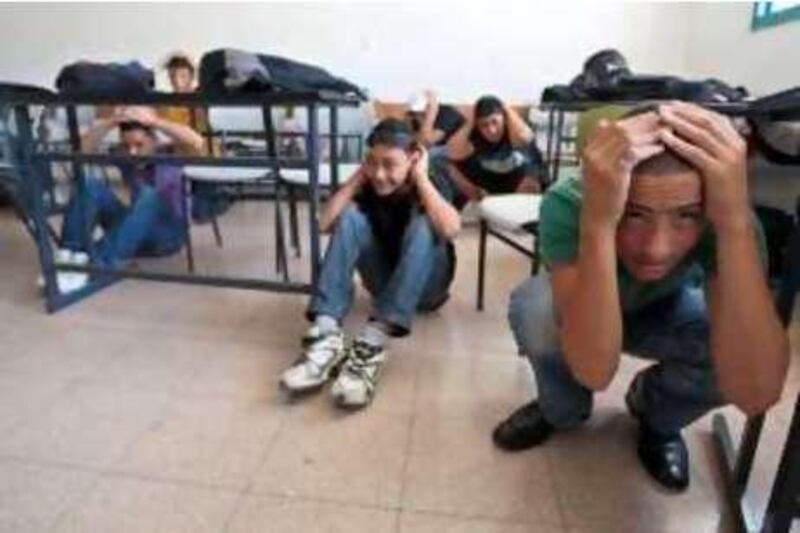NAZARETH // With most Israelis assuming a new Middle East war is just around the corner, settler leaders are trying to prove to their compatriots that some 120 illegal Jewish colonies in the West Bank will provide an indispensable safe haven in time of emergency.
The settlements have drawn up plans to accommodate as many as half a million Israelis forced to flee areas inside the country's recognised borders if they come under rocket fire in wartime. Naftali Bennett, the head of the settlers' main council, Yesha, called the West Bank the ideal "place of refuge for the nation" at a press conference last week. His announcement came in the midst of a week of drills to test the country's readiness for war.
According to the right-wing Jerusalem Post newspaper, the settlers' plan has the backing of the two main official bodies in charge of dealing with the protection of Israeli civilians, the Home Front Command and the National Emergency Authority, as well as army commanders in the West Bank. Mr Bennett said he believed the settlements would be a popular choice with evacuees because they had not been targeted with rockets in recent confrontations, such as the 2006 Lebanon war and Operation Cast Lead in Gaza nearly 18 months ago.
Observers have noted that over the past four years Hizbollah has acquired much longer-range missiles that could reach most of the West Bank. But Mr Bennett and the settlers appeared to be pinning their hopes on the fact that enemy groups would be loath to fire rockets at the settlements when they are located so close to Palestinian communities. Hagit Ofran, who monitors settlements for Peace Now, an Israeli group, said the move was a "cynical public relations exercise" designed to endear the settlers to ordinary Israelis.
"This is clearly an initiative from the settlers that they hope will bring them greater legitimacy." The national drill is intended to improve co-ordination between emergency services after an investigative panel, the Winograd Committee, severely criticised their failings during the 2006 Lebanon war, a month-long confrontation with Hizbollah. The Lebanese militia responded to Israel's bombardment of large areas of Lebanon by firing thousands of rockets into northern Israel, causing hundreds of thousands of Israelis to flee south.
Although it is the fourth drill since 2006, it is believed to be the first time that the half a million settlers and their communities, which are illegal under international law, have been incorporated into evacuation scenarios. Exercises during the week included rescuing trapped and wounded civilians, evacuating them from areas under rocket fire, and resettling civilians in safe zones. Elon Moreh, home to more than 1,000 settlers and located close to the large Palestinian city of Nablus in the central West Bank, was reported to have practised "absorbing" refugees from Tel Aviv injured in a mortar attack.
There were similar exercises involving students at the main college in the settlement of Ariel and in some of the 40 settlements in the Binyamin regional council, which surrounds Palestinian communities near East Jerusalem and Ramallah. Mr Bennett said in a real attack there were plans to provide armoured buses to transport people from Tel Aviv and other heavily populated areas of central Israel into the West Bank. He said most parts of Israel were within easy reach of a settlement.
During the 2006 Lebanon war, most fleeing Israelis headed for Eilat, the country's most southerly resort, or Tel Aviv, where some created makeshift camps on its beaches. Only about 10,000 people were reported to have chosen the West Bank, all of them on their own initiative. But Mr Bennett said the next war would be different. The settlements had already devised a programme to absorb 100,000 people in schools, public buildings, offices and homes. He said there was also an "extreme scenario" in which half a million evacuees would be housed, doubling the population in the settlements overnight.
Avi Roeh, the head of the Binyamin council, said the settlers were "a population that gives" and they would organise for tents and simple housing kits to be quickly erected. Jeff Halper, the head of the Israeli Committee Against House Demolitions, said there might be "some logic" to the settlers' claim that their communities could provide shelter from rocket attacks. "Many Israelis fled Tel Aviv during the first Gulf War [in 1991] but people stayed put in Jerusalem, probably because they thought - rightly - that [Iraq's leader] Saddam Hussein would not fire on a city that included a large Palestinian population and Islamic holy sites."
He added that the settlers probably hoped to "strengthen the idea that not only are they 'the heart of the nation', as they like to call themselves, but that they are also there to save Israelis in an emergency." The national drill culminated on Wednesday in nearly 3,000 sirens wailing across the country as Israelis were urged to head for the nearest shelter, either a public one or in their home. Almost half of Israelis were reported to have taken part.
The Israeli media reported that financial constraints mean the army has only 60 per cent of the gas masks needed to ensure the whole Israeli population is protected from chemical attack. So far only five per cent of Israelis have been issued with masks after a mass recall a few years ago to refurbish them. Mohammed Zeidan, the director of the Human Rights Association in Nazareth, which published a report shortly after the 2006 Lebanon war on discrimination against Israel's Palestinian citizens in the provision of bomb shelters, said there had been no change four years later.
"There are still no public shelters in Arab communities and we can guess who won't get gas masks if there are not enough to go around," he said.
Some 30 high-level foreign visitors, including the head of the US National Guard, Craig McKinley, were reported to have observed the drill to learn lessons for their own countries.
foreign.desk@thenational.ae






